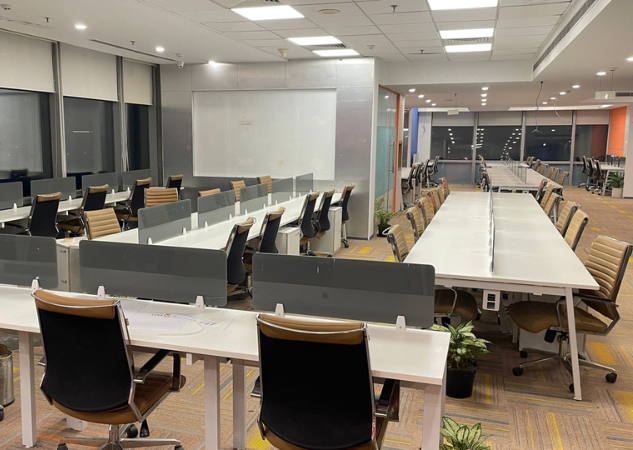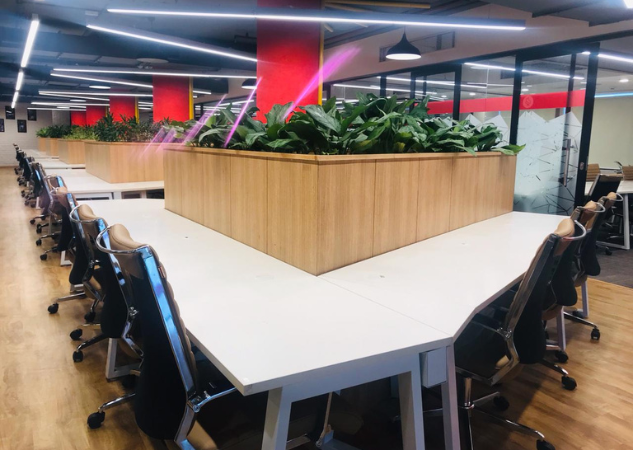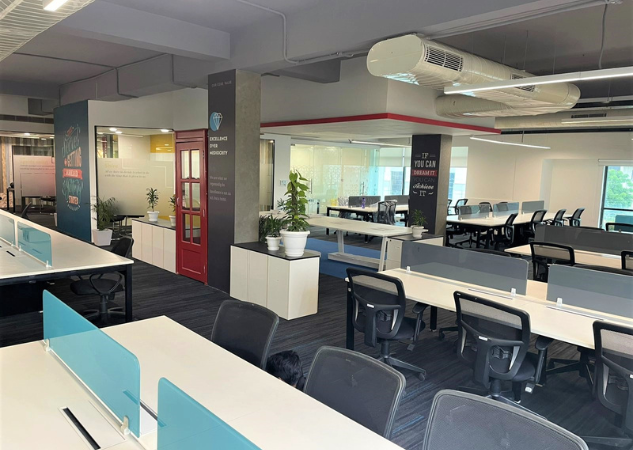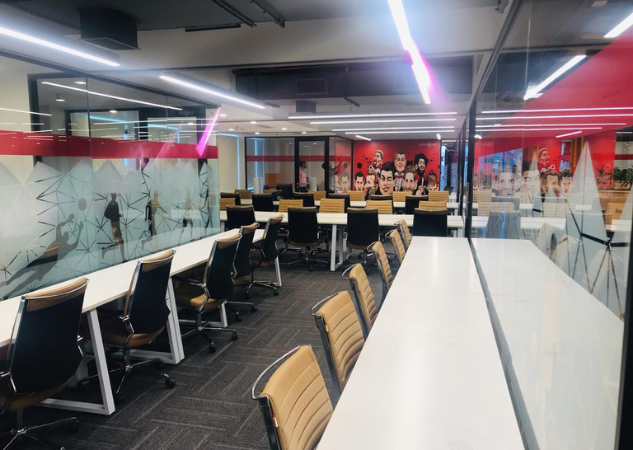Coworking spaces have become a key driver of startup success, offering flexibility, community, and growth opportunities.
💡 Are you looking for Coworking space in Gurgaon, Noida or Delhi? We are just a call away.
Call Now: 08999 828282
10 Ways Coworking Spaces Boost Startup Success
- A Cost-Effective Launchpad for Startups
- Access to a Thriving Business Community
- Built-In Business Support Services
- Networking and Partnership Opportunities
- Flexible Work Environment That Grows With You
- Boosted Productivity in a Professional Setup
- Exposure to Innovation and Fresh Ideas
- Enhanced Brand Credibility
- Wellness and Work-Life Balance Support
- The Role of Community Managers
1. A Cost-Effective Launchpad for Startups
Setting up a traditional office can be expensive and risky for new businesses. Coworking spaces for startups offer an affordable and flexible solution. Entrepreneurs can rent desks or small offices without long-term contracts, saving money on utilities, maintenance, and furniture. This low-cost setup helps startups focus their budget on building their product or service instead of worrying about overhead. With coworking and startups working hand-in-hand, more local entrepreneurs can take the leap without financial stress.

2. Access to a Thriving Business Community
One of the biggest benefits of coworking spaces for startups is the access to a vibrant community of like-minded individuals. Being surrounded by other entrepreneurs, freelancers, and innovators creates opportunities to share knowledge, solve problems, and even collaborate. This environment fosters motivation and encourages fresh ideas, helping startups stay inspired and connected. Coworking for startups means never building your dream in isolation.
3. Built-In Business Support Services
Many coworking spaces offer valuable support services tailored for startups. These may include on-site legal consultants, financial advisors, marketing professionals, and even startup mentors. Access to these resources, often included in the membership, reduces the need for costly external services. This support infrastructure helps local startups make better business decisions early on and scale with confidence.
Also Read: 10 Signs You Should Move Your Office to a Coworking Space
4. Networking and Partnership Opportunities
Coworking spaces for entrepreneurs are natural hubs for networking. Regular events, pitch sessions, and workshops bring together startups, investors, and business experts under one roof. These events encourage collaboration and lead to valuable partnerships. Startups can find their next co-founder, client, or investor just a desk away. This built-in network is often what gives local startups the edge in their early growth stages.
5. Flexible Work Environment That Grows With You
Startups need the flexibility to grow, downsize, or pivot quickly. Unlike traditional leases, coworking spaces offer a range of options—from hot desks to private suites—allowing teams to adjust as needed. This flexibility supports business agility, which is vital during the unpredictable early stages of a startup. Whether you’re a solo founder or a growing team, coworking adapts to your needs.
6. Boosted Productivity in a Professional Setup
Working from home can lead to distractions and isolation. Coworking for startups provides a focused, professional environment that enhances productivity. With fast internet, meeting rooms, printers, and other amenities, entrepreneurs can perform at their best. The energy of a shared workspace also encourages discipline and structure, helping founders build strong daily habits and meet their goals faster.
7. Exposure to Innovation and Fresh Ideas
Coworking spaces attract a wide variety of professionals—from tech developers and marketers to designers and consultants. This mix of talent and perspectives fuels creativity and innovation. When startups work alongside others in different industries, they’re more likely to think outside the box. This cross-pollination of ideas is a unique advantage of coworking and startups growing together.
8. Enhanced Brand Credibility
Having a dedicated business address and access to modern meeting spaces can elevate a startup’s image. Clients and investors take startups more seriously when meetings are held in professional environments. Coworking spaces for startups provide this level of professionalism without the high costs. This can make a big difference when establishing early trust and credibility in the market.
💡 Are you looking for Coworking space in Gurgaon, Noida or Delhi? We are just a call away.
Call Now: 08999 828282
9. Wellness and Work-Life Balance Support
Modern coworking spaces often include wellness features like quiet zones, ergonomic furniture, yoga rooms, and healthy snack options. These features support mental health and work-life balance—crucial for startup founders under pressure. By reducing stress and encouraging breaks, coworking spaces help entrepreneurs maintain energy and motivation throughout their startup journey.
10. The Role of Community Managers
Community managers are the heart of a coworking space. They welcome new members, organize events, introduce people with shared interests, and keep the atmosphere positive and productive. For coworking spaces for entrepreneurs, community managers act like connectors and facilitators. They ensure startups make the most of the space—helping with logistics, encouraging collaboration, and creating a sense of belonging. Their presence enhances the coworking experience significantly.
Coworking spaces have become a powerful catalyst for local startups, offering more than just desks and chairs. They foster collaboration, innovation, and a vibrant community where entrepreneurs can network, learn, and grow together. For startups seeking flexible, affordable, and fully managed workspaces, The Office Pass (TOP) stands out as a trusted choice. With locations designed to help local businesses thrive, TOP provides the perfect ecosystem to turn bold ideas into reality. Ready to give your startup an edge? Contact The Office Pass (TOP) at 8999 82 82 82 today!
Frequently Asked Questions (FAQs)
Question: What is a coworking space?
Answer: A coworking space is a shared office environment where individuals and companies work independently or together. It includes amenities like Wi-Fi, meeting rooms, and common areas. Coworking spaces are popular with freelancers, remote workers, and especially startups due to their flexibility and affordability.
Question: Why should startups consider coworking spaces?
Answer: Startups benefit from coworking because it offers affordable rent, networking opportunities, and professional facilities without long-term commitments. It allows new businesses to grow in a flexible and supportive environment, surrounded by other innovators and entrepreneurs.
Question: What are the main benefits of coworking for startups?
Answer: Key benefits include cost savings, access to a creative community, networking, flexibility, productivity boosts, and business support services. Coworking spaces for startups also help enhance brand image and provide a motivating atmosphere.
Question: Can startups scale easily in coworking spaces?
Answer: Yes. Most coworking spaces offer scalable solutions—hot desks, private offices, and meeting rooms—so startups can adjust their space needs as they grow without changing locations or breaking leases.
Question: How do coworking spaces support networking?
Answer: Coworking spaces often host events, workshops, and networking sessions. These gatherings help startups meet other entrepreneurs, investors, and potential partners, making it easier to form valuable business relationships.
Question:Do coworking spaces offer mentorship or startup help?
Answer: Many coworking spaces provide mentorship, startup workshops, and business advisory services as part of their community offerings. These resources are especially helpful for early-stage startups looking for guidance and support.
Question: Is a coworking space better than working from home for a startup?
Answer: For most startups, yes. Coworking provides a more professional, structured environment that supports focus and collaboration. It also reduces isolation and gives access to business services and networking that home offices don’t offer.
Question: What is the role of a community manager in a coworking space?
Answer: Community managers manage daily operations, welcome new members, plan events, and foster collaboration. They help startups settle in, connect with others, and make the most of the coworking experience.
Question:Are coworking spaces only for tech startups?
Answer: No. While tech startups are common, coworking spaces are suitable for all kinds of businesses—creative agencies, marketing firms, consultants, educators, and more. Any entrepreneur can benefit from a coworking setup.
Question: How can I find a good coworking space for my startup?
Answer: Look for spaces that offer flexible plans, good amenities, a vibrant community, and strong support services. Visiting in person and speaking to the community manager can help you decide if it’s the right fit for your startup.









